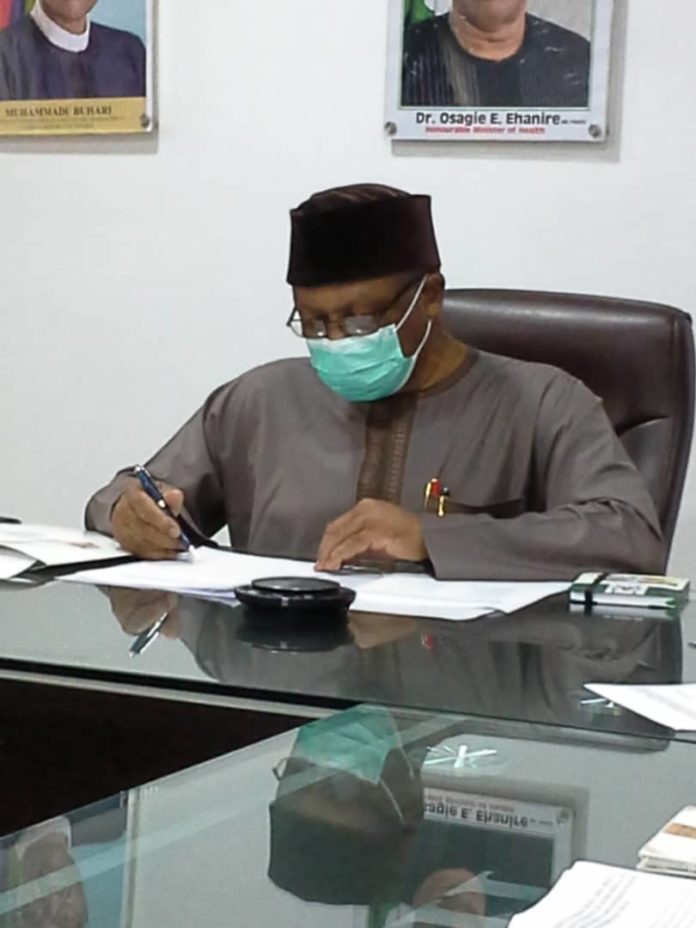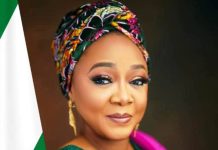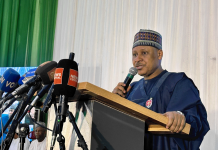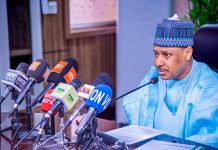PROTOCOL
Nigerian healthcare professionals in diaspora have, over the years, engaged themselves in various healthcare related activities and initiatives intended to contribute to the growth of Nigeria’s health sector and serve the needs of citizens in their home country. Activities range from self-sponsored medical missions to towns and villages, to conducting health education, training, public health interventions and advocacy, all of it, free of charge to beneficiaries. We also know that some of these missions include persons who are not of Nigerian origin, but volunteer their time to serve with diaspora teams; hence the title “Diaspora Plus”. Dear Nigerian diaspora professionals, your fellow citizens and your country cannot thank you enough for your commitment, your passion and selfless service.
- To utilise the talents, knowledge and goodwill of our citizens living and working abroad in more developed countries, to develop and strengthen our health sector, the Federal Government, through the Ministry of Health, went into a collaboration agreement with our diaspora healthcare specialists in a Memorandum of Understanding (MoU) with their various associations in the United States of America, Canada, Great Britain, Germany and South Africa. The aim is to bring their knowledge, skills and experience to add value to our society, in a structured, more productive and beneficial manner, that allows us best access to cutting-edge science and innovation of the developed world by sharing their perspectives with their home brethren. This will contribute, to reducing out-bound medical tourism.
- The pivotal activity which the Diaspora Health Professional groups have been conducting over these years is medical missions to various parts of Nigeria, including rural, hard-to-reach areas. These medical missions increased access to affordable, quality healthcare to citizens and brought specialty medical and dental consultation and treatment to those at the grassroots. This can still go on under certain conditions; but the hard reality of today is that security considerations limit our liberty to go everywhere in the country, except with armed protection. Besides, the basic healthcare provided at this level can be better contracted to local medical personnel, so that the full value of diaspora professionals can be better directed towards building capacity at our institutions of learning.
- We have medical, nursing, medical laboratory, pharmacy, public and community health, and other colleges in our universities, where courses, both in theory and practice, can be taught to impart new knowledge and difficult skills to your country men and women. This is a very efficient way of getting more out of the limited stay during your missions, by engaging yourselves more in training institutions to “train the trainers” and demonstrate new skills, and also render service to the needy. The medical mission will still come to fill gaps in learning for health service, as you desire. All areas of health education can be improved in this way, as missions play the role of supporting and sponsoring advanced medical training on a platform of knowledge sharing.
- For effective planning, coordination, sustainability and leadership, I selected 2 experienced and highly qualified academic leaders from our universities, as Co-Chairmen: in alphabetical order, Prof. Philip Abiodun, of the University of Benin, a paediatrician and Prof. M. Aghaji, of the University of Nigeria, a cardio-thoracic surgeon. One is a reputable home-grown don, the other reputable diaspora-trained don. Between them, they have over 80 years of experience and passion in the health sector of Nigeria. They will be working with a crack team of the Federal Ministry of Health, the Diaspora Commission and experts in all areas of health to conceptualise an idea to harness the knowhow of Nigerian health professionals in diaspora, including data, personnel, hospital and health management skills for the benefit of Nigeria.
- The programme is expected to pay particular attention to the critical subject of capacity building, mobilising, harnessing, and deploying human capital resources in the most efficient manner. We seek to engage diaspora healthcare professionals and experts to work alongside our home-based colleagues, to enhance the standards of healthcare services in Nigeria.
- Strategic partners, crucial to a smooth take-off and implementation of the programme include: Chief Executives of our Tertiary Health Institutions, the Medical and Dental Council of Nigeria (MDCN), the Nursing and Midwifery Council of Nigeria (NMCN), the Pharmacists Council of Nigeria (PCN), the Pharmaceutical Society of Nigeria (PSN), Medical Laboratory Science Council of Nigeria (MLSCN), Nigerian Medical Association (NMA), the Association of Medical Laboratory Scientists of Nigeria (AMLSN) and the National Association of Nigerian Nurses and Midwives (NANNM).
- A committee of experts was constituted to review the concept note for implementation of the Diaspora Professional Healthcare Initiative (DPHI). The Terms of Reference of the Committee are:
- To review the concept note of the DPHI with a view to redesign the earlier programme
- To develop strategies for coordinating activities of the DPHI
- To prioritise initiatives that support effective knowledge and skills transfer to Nigerian students and professionals
- To design and assign courses, tutorials, and seminars, including by remote communications, that can deliver cutting-edge perspectives in health sciences to colleagues and students in higher institutions
- To design and set up workshops for hands-on demonstration, practice, simulation, and experience sharing
- To participate, in actual service delivery initiatives in secondary or tertiary hospitals
- To coordinate such initiatives of non-Nigerian volunteers at rendering similar services as Nigerian diaspora
- To support efforts of Diaspora Nigerians and other nationals, at investing in Nigeria, especially in the Health sector.
- The members of the committee are as follows:
|
i. |
Prof. P. O Abiodun |
Paediatrician, UBTH |
Chairman |
|
ii. |
Prof. M. A. Aghaji |
Cardio-thoracic Surgeon, UNTH |
Co-Chairman |
|
iii. |
Hon. Abike Dabiri Erewa |
Chairman/CEO NIDCOM |
Member |
|
iv. |
Dr. Adebimpe Adebiyi, mni |
Director Hospital Services, FMoH |
Member |
|
v. |
Dr. J. A. F. Momoh |
CMD National Hospital; Chairman, Committee of Chief Executive of FTHIs |
Member |
|
vi. |
Dr. Abdullahi Ibrahim |
MD FMC, Azare; FMC Chair, Committee of Chief Executives FTHI |
Member |
|
vii. |
Dr. T. A. B. Sanusi |
Registrar, MDCN |
Member |
|
viii. |
Alh. Faruk Umar |
Registrar, NMCN |
Member |
|
ix. |
Pharm. Elijah Mohammed |
Registrar, PCN |
Member |
|
x.
|
Dr. Tosan Erhabor |
Registrar, MLSCN |
Member |
|
xi. |
Representatives of: |
|
Member |
|
xii. |
Representatives of: |
|
Member |
|
xiii. |
Dr. O. R. Olowu, mni |
Head PPP/Diaspora Unit, FMoH |
Member/Secretary |
|
xiv. |
Representatives of: |
|
Observer |
- And now ladies and gentlemen, it is my privilege to inaugurate this committee. I charge all members to discharge this responsibility to the best of their ability, to redesign the programme to provide access to more knowledge and skills for better medical education and training, for value addition and ultimately qualitative health care for the citizenry and to rebuild confidence in the indigenous national health care system of Nigeria.
Thank you for your attention.






